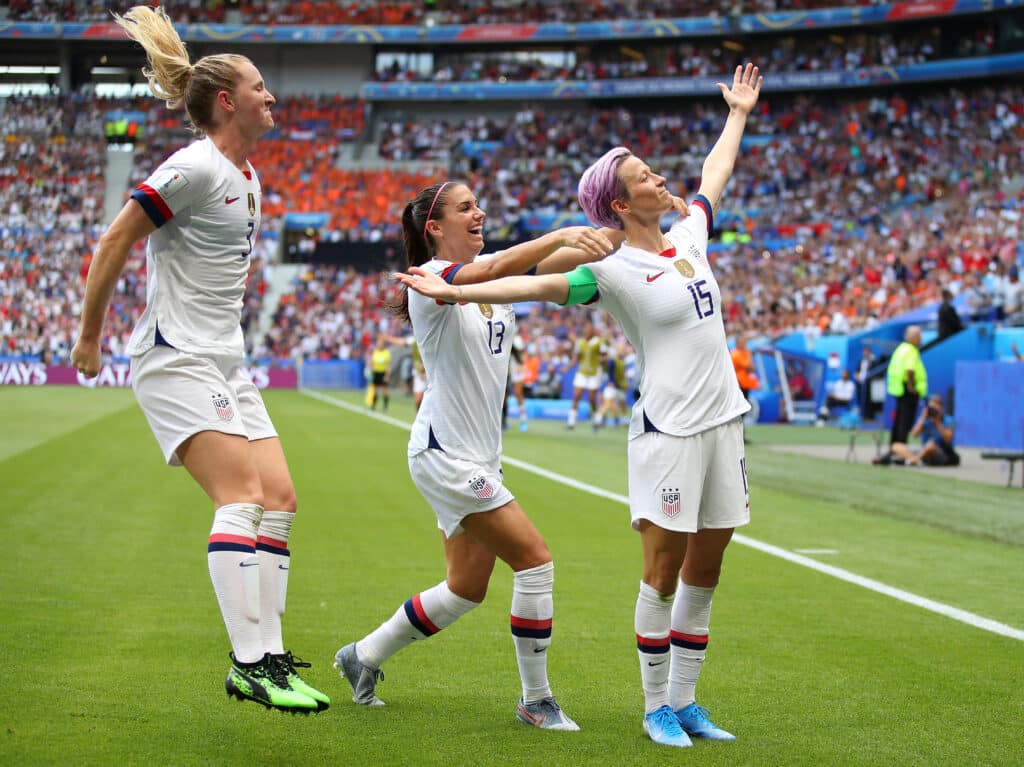Understanding Olympic Soccer: Rules, Regulations, and Differences

By Scott Kacsmar
When the Paris 2024 Olympics kick off in July, there will be dozens of sports and hundreds of events held, showcasing both legends and future stars. Those new to the Summer Olympics may be wondering if Soccer or Football as it is called outside the US is an Olympic sport that garners a lot of prestige, and we can safely say that it is one of the oldest and most celebrated events at the Summer Games.
When did soccer become an official Olympic sport? While it missed out on the inaugural Summer Olympics in Athens, Greece in 1896, it has been included in every Summer Games since, excluding 1932 when they wanted to promote the new FIFA World Cup tournament.
But Olympic soccer does have some notable differences from how Premier League Football or an international competition like the FIFA World Cup work. We wanted to highlight some of the Olympic soccer rules such as the Olympic soccer age limit, team compositions, the differences between men’s and women’s soccer teams, and how Olympic soccer compares to the FIFA World Cup.
Table of Contents
Key Features of Olympic Soccer
In the next two sections, we are going over the Olympic soccer roster rules and substitution policies.
Olympic Soccer Roster Rules: Age Limits and Team Composition
The main difference with Olympic soccer is that the men’s competition is largely composed of players under 23 years old and there is no age limit for the women’s teams, who are allowed to field their full national teams.
That means even great players like Cristiano Ronaldo (Portugal) and Lionel Messi (Argentina) have only played for their country’s national team one time each at the Olympics when they were under 23. Ronaldo was eliminated early in the 2004 games while Messi was a key contributor to Argentina winning the gold medal at the 2008 Summer Olympics in Beijing.
Magic Messi! ⚽
— The Olympic Games (@Olympics) December 15, 2022
Amazing Beijing 2008 memories, when Lionel Messi added Olympic gold to his medal collection! Will he be adding another new title this weekend? pic.twitter.com/z6ns2662Wy
For the men’s team, under 23 does mean you can be 23 (or younger). But a 24-year-old would be over the age limit. However, each men’s team is granted three exceptions to have players over 23 years old on their roster.
The roster size is 18 players for Olympic soccer squads (men and women). Eleven of the 18 players are allowed to participate in a match at a time, and the other seven are available as substitutes.
Substitution Policies in Olympic Soccer
In keeping up with a recent rule change at the FIFA World Cup, Olympic soccer matches will allow up to five substitutions per team. It used to be three substitutions until a permanent rule change in 2021 at the FIFA World Cup increased it to five.
For a player to be replaced by a substitute, these conditions must be applicable:
- A substitute can only enter the field of play at the halfway line and during a stoppage in the game.
- When the player leaves the field of play and the substitute enters the field of play, that completes the substitution.
- Once a player is substituted, they cannot return to the match.
If the match goes into extra time, then each team will be given a sixth substitution.
In-Depth Analysis of Game Regulations
Along with the International Olympic Committee (IOC), FIFA is part of the organizing body behind Olympic soccer, so many of the rules and regulations of the game are the same at the World Cup and the Summer Olympics.
However, in the next two sections, we are looking at specifics of how the game of soccer is regulated at the Olympics today, including the impact of yellow and red cards and the use of video assistant refereeing (VAR).
The Impact of Yellow and Red Cards in Olympic Soccer
Olympic soccer rules for yellow and red cards should be familiar to soccer fans who watch other forms of competition.
The yellow card is a caution for any player who commits more minor offenses such as unsportsmanlike behavior, dissent by word or action, delaying the restart of play, a persistent infringement on the game’s rules, or entering or re-entering the game without the referee’s permission.
A player is shown a red card when they commit a more serious offense, including two yellow-card infractions, a serious foul, violent conduct, spitting at someone, or when a non-goalkeeper denies the opponent a goal or scoring opportunity by handling the ball deliberately. Using offensive or abusive language is also red-card worthy.
Players receiving a red card are ejected from the match and cannot be replaced, leaving the team at a disadvantage for the remainder of time.
Implementing VAR in Olympic Soccer
Video assistant refereeing (VAR) had its Olympic debut in 2021 at the Tokyo Games. It will be used once again in Paris for soccer in the 2024 Summer Olympics.
The match referee can consult with the VAR’s access to video replay for important moments such as goals, penalty calls, red card decisions, and mistaken identity of a player.
When there is a VAR review, play is paused until a decision is ultimately made by the match referee, which can be from their own judgment or after accepting the view of VAR to reach that final decision.
Comparing Olympic Soccer to the FIFA World Cup
While Olympic soccer predates the FIFA World Cup by about three decades, make no mistake about it: FIFA wants the World Cup to remain the No. 1 global soccer competition. The World Cup is arguably the No. 1 sporting event in the entire world when you consider the billions of people who reportedly tune in every four years.
With that in mind, we have compared the two tournaments in the next two sections.

Format and Rules: Olympics vs. World Cup
The in-game soccer rules and the tournament format with a group stage and knockout stage are largely the same for the World Cup and the Olympics. The main difference between the two comes in the number of teams and players involved:
- In the Summer Olympics, there are 16 men’s teams and 12 women’s teams with a total of 18 players per roster with the men having an age limit restriction of no older than 23.
- In the FIFA World Cup, there have been 32 teams for both men and women, and starting in 2026, that number will increase to 48 teams for the men’s tournament. There is no age limit on any roster as well, and their rosters are larger with 23 players per team.
This makes the World Cup a bigger, much more global competition. Also, when you watch the Summer Olympics, you have to balance your time between watching the men’s and women’s tournaments as they go on at the same time. With the World Cup, they are usually held a year apart from each other, putting each on a bigger stage and pedestal in the world of soccer.
Analyzing the Pressure and Prestige of Olympic Soccer
The World Cup is considered the most prestigious soccer tournament in the world because of the sheer size of the competitive field and the best of the very best going at it every four years. In many ways, the World Cup is like what most Olympic events are with the best in the world competing against each other.
But Olympic soccer can still be considered the No. 2 most prestigious soccer tournament on the world stage. While it may not have all the great veteran players on the men’s side because of the under-23 age limit, you still get a good dose of the youth talent on the top teams, and women’s Olympic soccer has picked up in popularity where there is no age limit.
The Olympics also come with a great sense of national pride as these players are playing for their home country, and there can be high expectations for that. Countries like the United States and Brazil are always expected to do well in Olympic soccer as those countries have won the most medals historically. The United States lead all countries with four gold medals in soccer while the Brazilians have won the most overall medals in soccer at nine.
The Summer Olympics also generate huge ratings around the world, so there is a lot of pressure to perform at a high level for the sake of your country and all the viewers watching. Winning an Olympic medal is a huge honor for an athlete’s career, and while it may not be as great as winning the ultimate prize at the World Cup, it still rates highly as a prestigious achievement.
The Cultural and Professional Impact of Olympic Soccer
In the next sections, we are looking at what impact Olympic soccer is having on the popularity of the women’s game as well as the influence it can have on a young athlete’s career.
Advancing Gender Equality in Olympic Soccer
Despite soccer appearing in the Summer Olympics as early as 1900, it was not until the 1996 Summer Games in Atlanta that women were finally able to have their soccer tournament, which helped to balance gender equality. This followed the footsteps of the first women’s World Cup held in 1991.
At the 1996 Olympics, the women of the United States defeated China 2-1 in the final to win the gold medal. The validity of women’s soccer in the Olympics arguably led to more interest in the 1999 FIFA’s Women World Cup where the United States again beat China in a thrilling finale. That match was seen in person by over 90,000 people, setting an international record for spectators at a women’s sporting event. The winning penalty kick was made by Brandi Chastain, who removed her jersey and exposed her sports bra, leading to one of the sport’s most iconic photos and moments for women’s sports.
In the 21st century, the popularity of women’s soccer has only continued to rise with better pay and training facilities for the players the next steps in gender equality.

The decision to have no age limit at the Olympics for the women’s teams has also helped to make those events more exciting and reflective of the full talent of each nation.
The 2024 Olympics in Paris are expected to be the first Olympics ever where there are an equal number of men and women athletes over all events. The success of women’s Olympic soccer has no doubt helped reach that level of equality.
Olympic Soccer’s Influence on Athlete Careers
We mentioned how success on the global stage has helped the careers of soccer legends such as Lionel Messi and Brandi Chastain. In Messi’s case, he followed his Olympic gold in 2008 with his best individual season to that point as he led Barcelona to the first treble in Spanish football at 22 years old.
More recently, a young Neymar led Brazil to its first-ever gold medal in soccer at the 2016 Summer Olympics.
With the age limit in place at the Olympics for the men’s soccer teams, their performance at the Olympics can be a launching point for a young player to put their name on the map with a great tournament.

For the women, the Olympics can just be another showcase of their skill on a global stage similar to what they’ll encounter at the World Cup. It also can be good training for the World Cup since you’ll be able to play the best of the best with no age limit on the women’s side.
Man or woman, success at the Olympics can put a professional soccer player on the global stage as a great player, or at the very least, make them a national hero.
Conclusion: Olympic Soccer Schedule for Paris 2024
The Olympic soccer schedule is already out for Paris 2024 with the men’s group games starting on Wednesday, July 24 with the women getting in on the action the following day on the 25th.
The men’s gold medal match will take place on Friday, August 9 while the women’s gold medal match will be on Saturday, August 10, a day before the end of the Olympics.
Be sure to follow along with both tournaments to see many of the best in the world compete for Olympic glory.
Related Articles:



